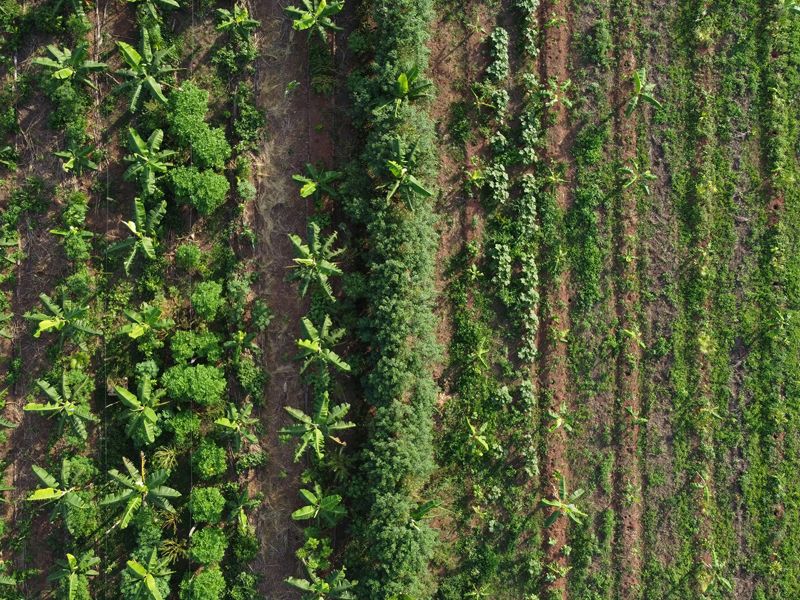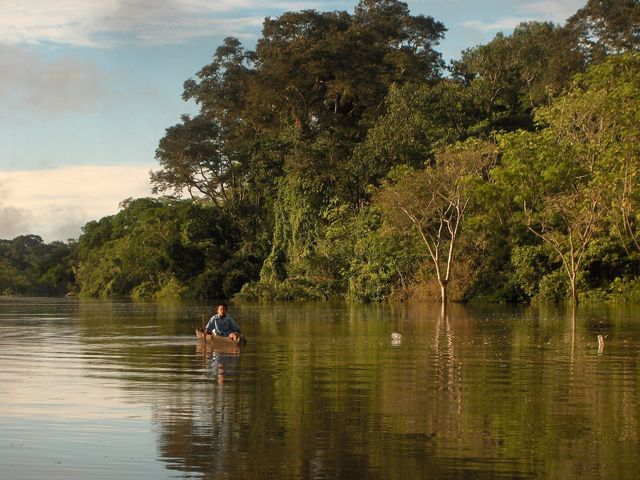
Our actions today determine the future of our planet.
Pará Brazil © Denys Costa
We are focusing on innovative, science-based solutions that match the urgency of the crisis: galvanizing partnerships to meet ambitious reforestation targets; growing food in ways that better partner with nature and store carbon; launching creative schemes to restore reefs that shelter coastal communities from storms; and supporting the transition to a clean energy future.
An Economy Rooted in Biodiversity
What happens in the Amazon affects all of us. The carbon stored in the largest tropical forest on Earth helps ensure climate stability worldwide; its extensive network of rivers hold one-fifth of all the water on the planet, and its rich biodiversity is home to one in every ten species.
Regrettably, this vast tropical forest is rapidly disappearing, and if deforestation continues, it could reach a tipping point, turning it into a fire-prone savanna. This would have devastating consequences for biodiversity and the global climate.
The Brazilian state of Pará is emblematic of the Amazon’s plight. Covering an area three times the size of California, it houses eight million people and 9% of the world’s rainforests. However, it also holds the unfortunate distinction of having Brazil’s fastest deforestation rate due to clearing for agricultural expansion and resource-based activities. Urgent action to halt forest loss in Pará is crucial to safeguarding the delicate web of life in the Amazon and to protecting our climate.
Addressing the interconnected crises of biodiversity loss and climate change requires transitioning to an economy that prioritizes thriving forests. Such a shift presents an opportunity for a more inclusive and equitable development model that also acknowledges the invaluable knowledge of biodiversity held by Indigenous Peoples and traditional communities.
“We are here, building, knowing that it is not something for me, but for all the people of Pará, for all Indigenous peoples, and for other generations to come, so we are building and leaving a legacy which will serve for other generations. It is a moment of contribution and learning.”
Chief Katia Silene Akrãtikatêjê, Indigenous leader
Pará has taken a leadership role in this endeavor. During COP27, it unveiled its State Bioeconomy Plan (Planbio) developed with support from TNC and in consultation with more than 40 organizations and 300 representatives from public and private sectors, universities, NGOs, Indigenous Peoples, and quilombolas and other traditional communities. The bioeconomy strategy has the potential to double the state’s GDP in two decades while effectively addressing climate change, biodiversity loss, and social inequity. By embracing sustainable practices and preserving its natural resources, Pará sets a compelling example for the entire world to follow.

“In the last few years, Pará was the state that emitted the largest amount of CO2 in the Brazilian territory, and that challenged us to find a solution that would allow a transition and better use of the soil in a state with enormous territorial expanse. Planbio is part of the Amazon Now Plan, which has actions that solidify Pará’s socio-economic and environmental transformation with monitoring, inspections, control, and land-use assessment.”
Helder Barbalho, Pará’s governor
Climate Adaptation
Reefs protect coastal communities and infrastructure by dissipating storm surges caused by hurricanes. The Mesoamerican Reef provides coastal protection for nearly 2 million people and a 14-billion-dollar tourism industry in Belize, Guatemala, Honduras, and Mexico.
In 2022, TNC successfully expanded post-storm reef restoration capacity to cover 50% of the Mesoamerican Reef. Restoration coverage now includes Belize, Honduras and Guatemala, and additional Marine Protected Areas in Mexico. TNC has been instrumental in helping all four countries establish national programs, reef repair brigades, protocols, and insurance coverage, in close collaboration with our partner, MAR Fund.
We have also expanded the restoration approach to encompass sand dunes, another vital source of coastal protection. In 2022, TNC collaborated with six hotel corporations that invested in and restored sand dunes within their properties. These efforts triggered a strong demand for knowledge and capacity to restore dune vegetation. Subsequently, in 2023, TNC and partners trained over 300 personnel from local hotels, consultancies, and dune vegetation nurseries. LINK
This is the decade to save the planet—to restore, regenerate, repair and recover.

Roots for Change
In Brazil’s Mantiqueira Mountains, a vital region within the imperiled Atlantic Forest, a groundbreaking project is showcasing the remarkable benefits of forest restoration. Inspired by the successful Extrema Municipality project, where 2 million trees were planted, and payment for ecosystem services (PES) was pioneered, the Conservador da Mantiqueira initiative has set its sights on an ambitious goal. It aims to unite stakeholders from 425 municipalities surrounding Brazil’s major markets in São Paulo, Rio de Janeiro, and Minas Gerais. Their collective mission is to scale up forest restoration and reforest a vast 1.5 million hectares by 2030.


At the heart of this endeavor lies a powerful collaboration between governments, universities, and civil society, facilitated by TNC. Thanks to their support, more than 100 municipalities in the Mantiqueira region have already joined the initiative, with 52 actively implementing essential environmental public policies.
The project’s impact extends goes far beyond planting trees. Through extensive training programs, field-day events, and webinars, 1,300 individuals now hold the knowledge to drive sustainable change. Moreover, TNC’s active participation in the Pact for Atlantic Forest Restoration and the Trinational Atlantic Forest Restoration Network has garnered well-deserved recognition from the United Nations for the endeavor, which was named one of ten World Restoration Flagship Initiatives in 2022.
The Mantiqueira restoration project is demonstrating that by safeguarding and restoring forests, we can enhance water security, invigorate rural economies, and contribute to combating climate change. LINK
Clean Energy Transition
A renewable energy transition is crucial in our fight against climate change. However, it is equally vital that we carefully plan and position new energy development to avoid adverse impacts on our environment, particularly concerning biodiversity and ecosystem protection. By factoring the needs of nature and people into energy infrastructure planning, we can pursue the complementary goals of addressing the climate crisis and conserving at least 30% of our lands, fresh water, and oceans by 2030.
TNC is collaborating with the Peruvian Ministry of Energy and Mines (MINEM) to implement a pioneering pilot project in the La Libertad region, specifically focusing on renewable energy zoning and siting. This process facilitates informed decision-making by governments and developers to avoid harming nature in the process of developing clean energy sources. The success of the initial phase has paved the way for an expansion to other regions, refining methodologies for broader adoption in the energy sector. Additionally, TNC and MINEM have conducted a planning exercise in the Marañón river basin—nestled in the Andean Amazon—assessing various hydropower development scenarios to protect free-flowing rivers. This partnership is promoting sustainable energy practices that preserve crucial ecosystems and pave the way for a greener future.
